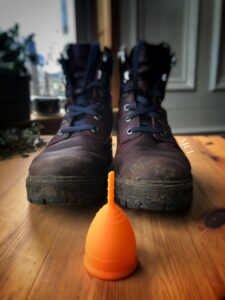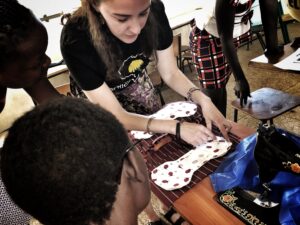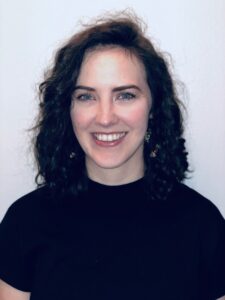The Wild Period: Exploring Menstruation Experiences in the Outdoors
About the author
Morgan Ludington, PhD Student at Moray House, University of Edinburgh. See below for more information about Morgan’s background and her current research.
Background

For my dissertation, I decided to explore a topic (menstruation) that I have previously researched in a new (for me) context. I explored the experiences of people who menstruate and outdoor leaders who have supported menstruators. To do this, I invited participants to complete an online questionnaire which allowed them to share stories of their experiences. I also interviewed four people who menstruate to gather a more in-depth understanding of their experiences in what it is like to menstruate in the outdoors – how they prepare, how they talk about menstruation with others, and how it impacts their outdoor activities. The purpose was to discover if this is something that is talked about, is a problem, and/or if outdoor programs could better support menstruators.
What did I learn?
I learned that menstruators devote a lot of time and energy to overcome the difficulties that menstruation often imposes in order to continue their participation in outdoor activities. I heard stories of incredible resilience, self-reliance, and strength. Within the questionnaires and in the interviews, many of these stories were shared with a tone of
“Well, those are the cards I’ve been dealt and so I just get on with it”.
Despite receiving so many positive responses and enthusiasm, there were echoes of “some people find it icky, so I manage it on my own” throughout the stories. It amazes me that near half the population menstruates at some point in their life, and yet it is rarely talked about. Even in outdoor spaces, when people are seemingly more open to discussing other bodily functions, it is a tense subject that not all outdoor leaders broach (according to my participants at least). It seems to me that menstruation, as the universal experience it is, should be unifying and provide a grounding for solidarity amongst those who menstruate. But rather, it remains cloaked in stigma, shame, and silence making it an isolating and individual experience.
Where were the male voices?
It was interesting that no one identifying as male participated, even though the outdoor leader questionnaire was open to all outdoor leaders and I reached out directly to male outdoor leaders. This is a conversation for everyone, not just women, not just menstruators, because it is a human experience. We all know someone who does, has, or will menstruate and we all need to have some knowledge to support them or at least not continue the stigmas.
The Power of Sharing Our Stories
For my own practice, the power of allowing someone time and space to share their experiences has been reinforced. In the past few years, speaking about periods has become more popular, yet there are still many stigmas around the experience of menstruation – pressure to keep it invisible and to not talk about the difficulties that accompany the menstrual cycle. I also learned about how it is not always the physical experience of menstruation that is the most difficult, but oftentimes there is a mental component. Thoughts of
“Do I have enough supplies?” “Will I be able to find a private space?” and “Generally I just feel like shite and it’s hard to get motivated”
weigh heavily on menstruators. Many of these things are not unique to an outdoor space, but may be harder to overcome when supplies are not readily available and you do not have the option to rest until you are feeling better.
 Who am I?
Who am I?
I am a menstrual activist who is passionate about continuing my understanding of menstrual experiences across various cultures and contexts. Before this research, I worked with Dandelion Africa, a grassroots organization in Kenya. Together, we created and implemented a program to increase menstrual and reproductive education and taught local seamstresses to make reusable cloth menstrual pads out of local materials. When I’m not reading books about bleeding, I can usually be found dancing, reading, crocheting, or wandering around Edinburgh with a coffee. Any other free time is spent FaceTiming family (I am the best aunt to the greatest kids) and friends back in the U.S. Before COVID-19, my friends had trouble remembering which country I was currently romping through.
What am I doing now?
I have begun the PhD program at Moray House, University of Edinburgh with a research proposal focused on exploring menstrual stigmas. I hope to discover if sharing our stories will help end the stigma. During this time, I am also focusing on my own menstrual experience and how it impacts my daily life and PhD life. Basically, if you ever run into me, the conversation will inevitably include something about menstruation.
I am happy to continue this conversation or share stories through email: s1994470@ed.ac.uk
The research has been published in IOL Horizons Magazine.
The full dissertation is not available: The author is awaiting publication in academic journals.
Contact the Outdoor and Environmental Education Programmes for more information: OEE.Programmes@ed.ac.uk





Comments are closed
Comments to this thread have been closed by the post author or by an administrator.